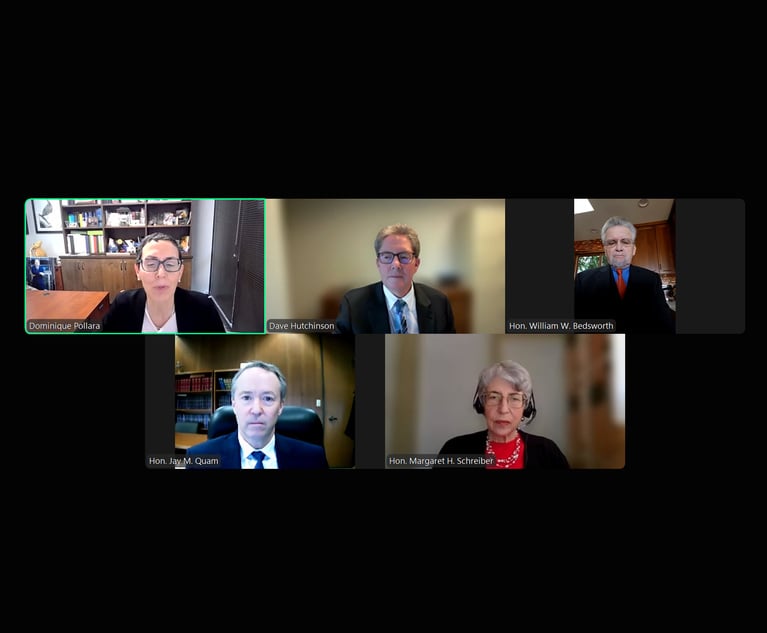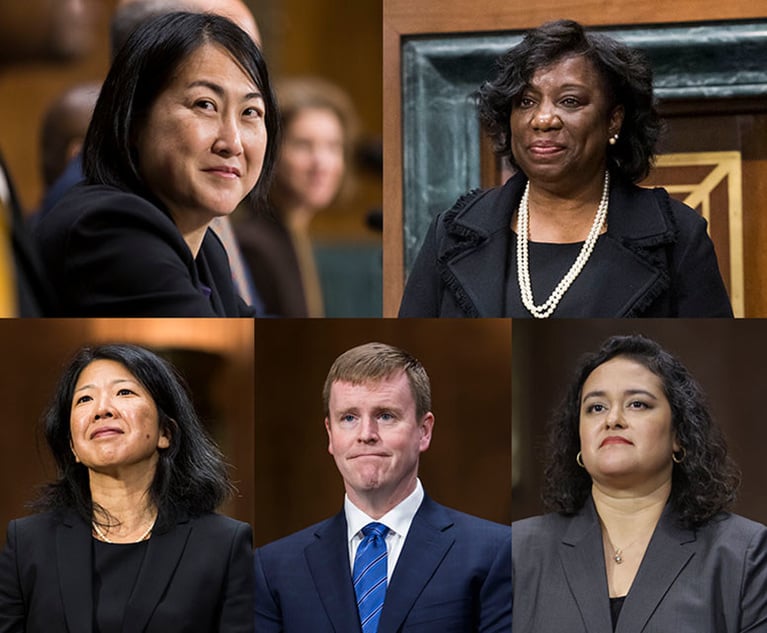 Samsung Galaxy S7 Edge. Photo: Shutterstock
Samsung Galaxy S7 Edge. Photo: ShutterstockSamsung Asks 9th Circuit to Unpack Arbitration Orders for Galaxy S7
The U.S. Court of Appeals for the Ninth Circuit heard arguments in two cases that address whether manufacturers of consumer products adequately disclose arbitration agreements to customers.
August 29, 2019 at 06:36 PM
6 minute read
The original version of this story was published on The Recorder
When it comes to informing customers about an arbitration agreement, do companies need to think outside the box or judge their product materials on the cover?
Those questions, quite literally, were before the U.S. Court of Appeals for the Ninth Circuit on Thursday in a pair of appeals brought by Samsung Electronics America Inc. over arbitration agreements disclosed to consumers who purchase its Galaxy S7 and Galaxy S7 Edge smartphones.
Samsung, represented by Robert Katerberg of Arnold & Porter Kaye Scholer, is hoping to reverse decisions in both cases that rejected its motions to compel arbitration, in large part because adequate disclosures did not appear on the outside of the box or on the cover of a guidebook enclosed in the package. In so doing, Samsung sought to distinguish its product information from a 2017 decision by the Ninth Circuit in Norcia v. Samsung Telecommunications America, which rejected its arbitration motion under similar facts involving its Galaxy S4.
"When somebody spends hundreds of dollars on an expensive state-of-the-art technology device that they're going to carry with them for most of their waking hours, and use dozens of times a day," Katerberg said, "they're going to at least crack the cover of an important brochure that contains safety information in order to see what's inside."
Katerberg, a partner in Washington, D.C., argued for Samsung in both cases, which the Ninth Circuit consolidated for oral arguments in Seattle.
Plaintiffs lawyers in each case countered that there were many reasons to make the disclosures more apparent. In many cases, they said, an employee in the retail store pulls the phone out of the box, giving customers no opportunity to open the package themselves. Further, they argued, Samsung could change the wording and packaging if it wanted to, noting that today's smartphone boxes have adequate disclosures.
In the cases on appeal, the reference to "terms and conditions" is "vague to the point of being meaningless," said Jordan Elias, a partner at Girard Sharp in San Francisco. It does not clarify that consumers have agreed to an arbitration contract, or where to find the terms and conditions, he said.
"A reasonable consumer couldn't put two and two together, just like in Norcia," he said.
Elias represents Dulce Alondra Velasquez-Reyes, who brought a class action alleging Samsung's claims that the Galaxy S7 was waterproof were fraudulent, because hers stopped working after she "inadvertently" dropped it in the toilet. Steven Brannock, of Brannock & Humphries in Tampa, Florida, represents the plaintiff in the other case, Daniel Ramirez, who brought a personal injury lawsuit after his Galaxy S7 Edge caught fire in his pants pocket.
The cases are the latest to address whether manufacturers of consumer products adequately disclose arbitration agreements to customers. For Samsung, the dispute centers on the box, and not online provisions, like click-wrap agreements, which are the subject of a developing area of the law.
In Norcia, the Ninth Circuit looked at the box and the cover of the enclosed brochure in finding that Samsung did not adequately inform customers purchasing its Galaxy S4 they had agreed to an arbitration provision. Plaintiffs attorneys insisted that both U.S. District Judge Dolly Gee of the Central District of California and U.S. District Judge Anthony Ishii of the Eastern District of California relied on the 2017 decision in their orders involving the Galaxy S7.
"The district court correctly concluded that no arbitration agreement was ever formed between Samsung and Ms. Reyes," Elias said. "The court reached that conclusion under this court's Norcia precedent because, in Norcia and this case, Samsung's agreement was not called to the attention of the consumer."
According to Samsung, in the pair of cases before the Ninth Circuit, the Galaxy S7 product packaging was dissimilar to that in Norcia. In particular, the outside of the box referred to "terms and conditions" inside, which a guidebook reiterated on the first page, just after the cover page, while the page just after that specifically referenced the arbitration agreement.
"The issue in these cases is whether arbitration agreements with Samsung were formed when Mr. Ramirez and Ms. Velasquez-Reyes purchased and used their phones," Katerberg said. "Under California law, that turns on whether a reasonably prudent smartphone purchaser in their position would be deemed on notice from materials provided with the phones that there were terms and conditions that applied. The packaging and documents in these phones easily satisfied that standard."
He likened the cases to those in which courts have upheld arbitration agreements sent in the mail, where there are no references to "terms and conditions" on the envelope.
The same goes with the front cover of the guidebook, he said.
"The title of the brochure is not dispositive because what that essentially would assume is that this guidebook never gets opened," he said. "Essentially, it becomes a paperweight."
But, countered plaintiffs attorneys, the cover of the booklet referenced health and safety, and warranty information—not an arbitration contract. Circuit Judges Jay Bybee and M. Margaret McKeown jumped at that point Thursday.
"You haven't been alerted that there's anything other than a warranty or health and safety," Bybee told Katerberg.
But McKeown also grilled Elias on what Samsung specifically could do to remedy the problem.
"You keep wanting to say, this isn't good enough," she told him. "But when asked what's good enough, you're not able to tell us."
Elias responded that Samsung's packaging, as it appears today, tells customers that, by opening the box, they have accepted its terms and conditions, including an arbitration agreement, which is provided in the enclosed materials.
"I believe that could be sufficient, and that's what they did after this court handed down Norcia, which goes to show that they're perfectly capable of doing this," he said.
Brannock suggested that Samsung use a click-wrap agreement, which would ensure that consumers read and accepted the arbitration contract.
"We'll be back here deciding that case later," McKeown replied.
This content has been archived. It is available through our partners, LexisNexis® and Bloomberg Law.
To view this content, please continue to their sites.
Not a Lexis Subscriber?
Subscribe Now
Not a Bloomberg Law Subscriber?
Subscribe Now
NOT FOR REPRINT
© 2024 ALM Global, LLC, All Rights Reserved. Request academic re-use from www.copyright.com. All other uses, submit a request to [email protected]. For more information visit Asset & Logo Licensing.
You Might Like
View All
Litigators of the Week: After a 74-Day Trial, Shook Fends Off Claims From Artist’s Heirs Against UMB Bank

‘It's Your Funeral’: Avoiding Doing Damage to Your Client’s Case With Uncivil Behavior

Tips From—and About—the New Judges on the Northern District of California Bench
Trending Stories
- 1'Largest Retail Data Breach in History'? Hot Topic and Affiliated Brands Sued for Alleged Failure to Prevent Data Breach Linked to Snowflake Software
- 2Former President of New York State Bar, and the New York Bar Foundation, Dies As He Entered 70th Year as Attorney
- 3Legal Advocates in Uproar Upon Release of Footage Showing CO's Beat Black Inmate Before His Death
- 4Longtime Baker & Hostetler Partner, Former White House Counsel David Rivkin Dies at 68
- 5Court System Seeks Public Comment on E-Filing for Annual Report
Who Got The Work
Michael G. Bongiorno, Andrew Scott Dulberg and Elizabeth E. Driscoll from Wilmer Cutler Pickering Hale and Dorr have stepped in to represent Symbotic Inc., an A.I.-enabled technology platform that focuses on increasing supply chain efficiency, and other defendants in a pending shareholder derivative lawsuit. The case, filed Oct. 2 in Massachusetts District Court by the Brown Law Firm on behalf of Stephen Austen, accuses certain officers and directors of misleading investors in regard to Symbotic's potential for margin growth by failing to disclose that the company was not equipped to timely deploy its systems or manage expenses through project delays. The case, assigned to U.S. District Judge Nathaniel M. Gorton, is 1:24-cv-12522, Austen v. Cohen et al.
Who Got The Work
Edmund Polubinski and Marie Killmond of Davis Polk & Wardwell have entered appearances for data platform software development company MongoDB and other defendants in a pending shareholder derivative lawsuit. The action, filed Oct. 7 in New York Southern District Court by the Brown Law Firm, accuses the company's directors and/or officers of falsely expressing confidence in the company’s restructuring of its sales incentive plan and downplaying the severity of decreases in its upfront commitments. The case is 1:24-cv-07594, Roy v. Ittycheria et al.
Who Got The Work
Amy O. Bruchs and Kurt F. Ellison of Michael Best & Friedrich have entered appearances for Epic Systems Corp. in a pending employment discrimination lawsuit. The suit was filed Sept. 7 in Wisconsin Western District Court by Levine Eisberner LLC and Siri & Glimstad on behalf of a project manager who claims that he was wrongfully terminated after applying for a religious exemption to the defendant's COVID-19 vaccine mandate. The case, assigned to U.S. Magistrate Judge Anita Marie Boor, is 3:24-cv-00630, Secker, Nathan v. Epic Systems Corporation.
Who Got The Work
David X. Sullivan, Thomas J. Finn and Gregory A. Hall from McCarter & English have entered appearances for Sunrun Installation Services in a pending civil rights lawsuit. The complaint was filed Sept. 4 in Connecticut District Court by attorney Robert M. Berke on behalf of former employee George Edward Steins, who was arrested and charged with employing an unregistered home improvement salesperson. The complaint alleges that had Sunrun informed the Connecticut Department of Consumer Protection that the plaintiff's employment had ended in 2017 and that he no longer held Sunrun's home improvement contractor license, he would not have been hit with charges, which were dismissed in May 2024. The case, assigned to U.S. District Judge Jeffrey A. Meyer, is 3:24-cv-01423, Steins v. Sunrun, Inc. et al.
Who Got The Work
Greenberg Traurig shareholder Joshua L. Raskin has entered an appearance for boohoo.com UK Ltd. in a pending patent infringement lawsuit. The suit, filed Sept. 3 in Texas Eastern District Court by Rozier Hardt McDonough on behalf of Alto Dynamics, asserts five patents related to an online shopping platform. The case, assigned to U.S. District Judge Rodney Gilstrap, is 2:24-cv-00719, Alto Dynamics, LLC v. boohoo.com UK Limited.







